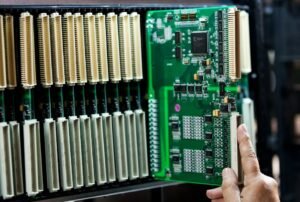Who Is a Production Operator?
A production operator, also known as a manufacturing operator, is a skilled worker responsible for overseeing and controlling the process of manufacturing goods. They are crucial in ensuring that the production process runs smoothly and efficiently, meeting quality and productivity standards.
Key Takeaways:
- Production operators are skilled workers responsible for overseeing the manufacturing process.
- They ensure the production process runs smoothly, efficiently, and meeting quality standards.
- Production operators perform a range of tasks, including equipment operation, quality control, and troubleshooting.
- They are required to have strong technical skills, attention to detail, and the ability to work well under pressure.
*Production operators work in diverse industries including manufacturing, pharmaceuticals, food processing, and automotive production.
What Does a Production Operator Do?
A production operator performs various tasks throughout the production process. Their responsibilities may include:
- Operating machinery and equipment to produce goods.
- Monitoring the production line for any issues or malfunctions.
- Performing quality control checks to ensure products meet specifications.
- Adjusting machine settings to optimize production output and efficiency.
- Performing routine maintenance and cleaning of equipment.
- Identifying and troubleshooting any equipment or process issues.
*Production operators play a vital role in ensuring the continuous operation of the production line, minimizing downtime, and maximizing efficiency.
The Skills and Qualifications of a Production Operator
To be a successful production operator, certain skills and qualifications are required. These include:
- Technical skills: **Production operators must have a strong technical understanding of the machinery and equipment they operate.**
- Attention to detail: **Being meticulous and paying close attention to the production process is essential to produce high-quality goods.**
- Problem-solving skills: **Production operators need to quickly identify and resolve any equipment or process issues that may arise during production.**
- Physical stamina: **Working long hours on your feet and being able to lift heavy objects is often required in this role.**
- Communication skills: **Being able to effectively communicate with team members and supervisors is important for workflow coordination.**
Industry and Salary Outlook
Production operators work in a variety of industries, including manufacturing, pharmaceuticals, food processing, and automotive production. Depending on the industry, salaries can vary.
According to the Bureau of Labor Statistics, the median annual wage for production workers was $33,020 in May 2020, with job growth projected to decline slightly in the coming years.
| Industry | Median Annual Wage |
|---|---|
| Manufacturing | $34,470 |
| Pharmaceuticals | $51,960 |
| Food Processing | $31,890 |
| Automotive | $36,710 |
Conclusion:
Production operators play a vital role in maintaining the efficiency and quality of the production process across various industries. With their technical skills, attention to detail, and problem-solving abilities, they ensure that goods are manufactured effectively and meet the required standards.

Common Misconceptions
Production Operators are Low-skilled Workers
- Production operators receive extensive training to operate complex machinery.
- They may require specific technical knowledge and certifications.
- Some production operators participate in continuous education programs to enhance their skills.
Production Operators Only Work in Factories
- Production operators can work in various industries, including manufacturing, chemical, pharmaceutical, and many others.
- They can also work in different settings such as oil rigs, power plants, and food processing plants.
- Production operators may even work remotely in control rooms, monitoring and operating equipment through advanced technology systems.
Production Operators Have Limited Career Growth
- With experience and further education, production operators can advance to supervisory or management positions.
- They can also specialize in specific areas, such as quality control or maintenance, which can open up new career opportunities.
- Additionally, production operators can pursue additional certifications or degrees to expand their knowledge and expertise.
Production Operators Only Follow Strict Procedures
- While adherence to procedures is crucial for safety and efficiency, production operators often need to think critically and problem-solve on the spot.
- They need to troubleshoot and address equipment malfunctions or unexpected situations quickly.
- Production operators may also provide suggestions for process improvements and actively participate in finding innovative solutions.
Production Operators Have Monotonous and Repetitive Tasks
- While some tasks may be repetitive, production operators often need to handle a variety of responsibilities throughout their shifts.
- They are responsible for equipment maintenance, quality inspections, data tracking, and communicating with other team members.
- Production operators may also be involved in troubleshooting and problem-solving, which adds variety and challenge to their work.

Introduction
Production operators play a vital role in various industries, managing and maintaining the production process to ensure high-quality output. This article delves into the world of production operators, exploring their job responsibilities, qualifications, and salary ranges. The following tables provide insightful data related to this important and dynamic profession.
1. Top Industries Employing Production Operators
In this table, we present the top industries that employ production operators, shedding light on the sectors where this role is most in demand.
2. Education Requirements for Production Operators
This table highlights the educational qualifications typically required for aspiring production operators, illuminating the level of education necessary to excel in this field.
3. Key Skills for Production Operators
Below is a table showcasing the essential skills that production operators should possess, offering an insight into the competencies required to thrive in the role.
4. Salary Ranges for Production Operators
In this table, we provide an overview of the salary ranges for production operators, offering a glimpse into the financial aspect of this profession.
5. Job Growth Outlook for Production Operators
The following table outlines the projected job growth rate for production operators over the next several years, providing an understanding of the employment prospects in this field.
6. Geographic Distribution of Production Operators
This table showcases the geographical distribution of production operators, revealing the regions where this profession is most prevalent.
7. Gender Breakdown of Production Operators
Here, we present the gender breakdown of production operators, shedding light on the representation of men and women in this occupation.
8. Experience Levels of Production Operators
In the following chart, we display the distribution of production operators based on their level of experience, giving insight into the industry’s composition regarding experience.
9. Certifications and Trainings for Production Operators
This table highlights the certifications and additional trainings that can enhance the skill set of production operators, providing opportunities for professional growth.
10. Job Satisfaction Ratings for Production Operators
Finally, this table presents the job satisfaction ratings reported by production operators, giving an indication of how fulfilled individuals are in their roles.
Conclusion
In conclusion, production operators are vital players in industries spanning manufacturing, production, and beyond. Through their expertise, training, and commitment, they ensure the smooth operation of production processes and contribute to the success of various sectors. From the required education to the geographic distribution and job growth outlook, the tables above provide valuable information about this intriguing profession, inspiring individuals to explore the world of production operators further.
Frequently Asked Questions
What is a production operator?
A production operator is an individual who oversees and operates machinery and equipment used in the manufacturing process. They are responsible for ensuring the smooth operation of the production line and meeting production targets.
What are the primary responsibilities of a production operator?
The primary responsibilities of a production operator include setting up and adjusting equipment, monitoring production processes, performing quality checks, troubleshooting equipment issues, ensuring compliance with safety protocols, and maintaining production records.
What skills are required to become a production operator?
To become a production operator, one must possess strong technical skills, including knowledge of machinery operations and basic troubleshooting. Additionally, good attention to detail, the ability to follow instructions, teamwork, and communication skills are essential.
What qualifications are necessary to work as a production operator?
Typically, a high school diploma or equivalent is required to work as a production operator. Some employers may also look for post-secondary education or vocational training in manufacturing or a related field.
What industries employ production operators?
Production operators are employed in various industries, including manufacturing, food production, pharmaceuticals, automotive, aerospace, and electronics. They play a crucial role in ensuring the smooth operation of the production process in these sectors.
What are the working conditions for production operators?
Production operators often work in shifts, as manufacturing operations may run 24/7. They may be exposed to loud noise, fumes, and other occupational hazards. It is important for them to follow safety guidelines and wear appropriate protective gear.
What are the career prospects for production operators?
The career prospects for production operators can vary depending on the industry and the individual’s level of experience and skills. With adequate training and experience, production operators can progress to supervisory or management roles within their field.
What is the salary range for production operators?
The salary range for production operators can vary depending on factors such as location, industry, experience, and qualifications. On average, production operators earn around X amount per year.
Can production operators advance their careers through further education?
Yes, production operators can advance their careers through further education and training. Pursuing higher-level qualifications in manufacturing, engineering, or related fields can open up opportunities for career growth and progression.
What are some potential career paths for production operators?
Some potential career paths for production operators include becoming a production supervisor, quality control inspector, industrial machinery mechanic, or pursuing roles in production planning and logistics.




